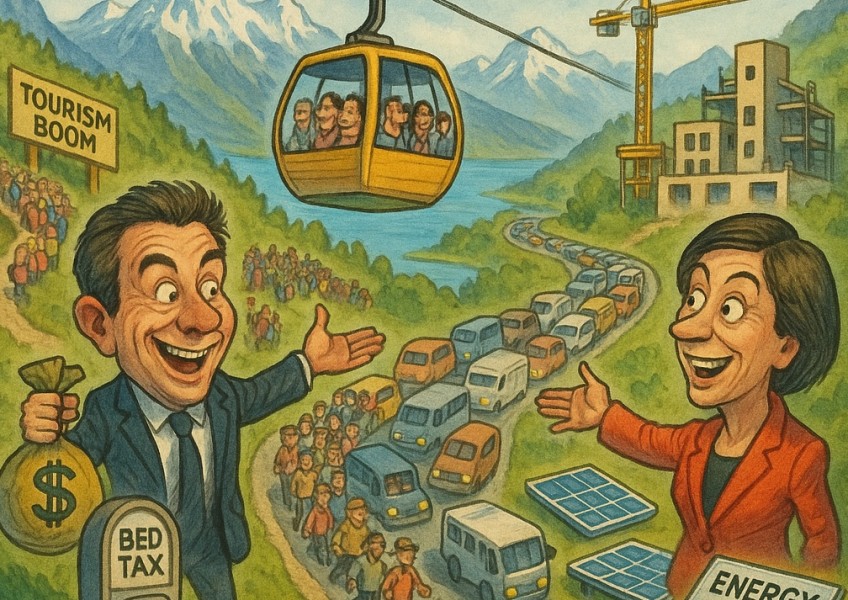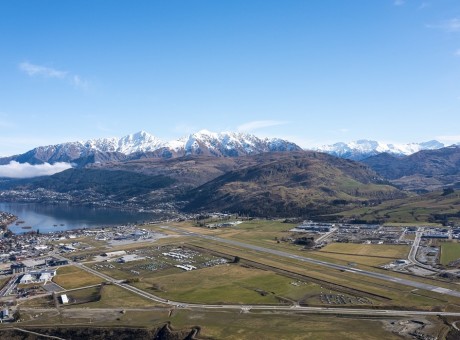Deal or No Deal?

Opinion: By Quentin Smith, QLDC Deputy Mayor
As Deputy Mayor, I see first hand how stretched our communities are. Growth here is outpacing infrastructure, housing, and health services, unsustainable rates increases and councils are left trying to patch gaps with limited resources. That’s why the idea of a “regional deal” is being considered—a partnership between councils, iwi, government, and our communities that could lock in funding and long-term priorities.
On the surface, it’s a seems like a great idea. But like any deal, the devil is in the detail.
The Opportunity
A regional deal could provide certainty. Instead of going cap in hand for every project, we’d have a shared roadmap backed by government. That could unlock the scale we need for big-ticket items—whether it’s improving transport investment, addressing housing shortages, or securing health services that match our growth and population.
It looks at things differently providing innovation in how we fund and deliver key needs of our district.
A regional deal could provide a chance to get on the same page, stop wasting time and resources. A deal would bring iwi, councils, and government together to focus on what matters most to our region and provide some certainty for private investment.
The Risks
But the risks are real. Once we sign a deal, we may be locked into its priorities for years, even if council or government change. If we get those priorities wrong, we could be stuck funding projects that don’t deliver.
Are government and local community even close to being on the same page? The government drive for growth at any cost in tourism and housing maybe in conflict with local ambition. We know all too well that pure bums on seats high volume tourism has its problems but seems to be the direction of government.
Never before have we seen such push and pull from government(s), changing policy, funding criterial and priorities make it hard to gain traction.
Commercial interests will inevitably be part of the mix of any deal. Public–private partnerships (PPPs) and private equity are increasingly shaping how big infrastructure gets built. Sometimes that helps—bringing investment and expertise—but it also means profit can compete with public good. If the balance tips the wrong way, communities end up carrying the cost while others walk away with the benefit.
We’ve already seen big ideas floated, like the Queenstown gondola. It’s pitched as a transport solution, but is it really about moving locals efficiently, getting cars off the congested road, or is it more of a tourism project wrapped in infrastructure clothing? The same questions apply to PPP proposals like a privately financed hospital. Yes, they might bring investment and get projects moving—but are they the right solutions in the right places, will the community be left with higher long-term costs, or less control over essential services?
Does the opportunities provide justification for less thorough evidence or consultation? And the Billion dollar question, who ultimately pays?
What Matters Most
That’s why four principles are non-negotiable for me:
- Evidence-based decisions – Projects must be tested with data and sound strategic planning, not just sold with glossy brochures.
- Community support – People across Wānaka, Queenstown, Cromwell and Alexandra must feel their needs are represented.
- Transparency – Communities must see who’s at the table, whose interests are being served, and how decisions are being made. It simply cannot all play out behind closed doors.
- $$$$$$$ - Does it bring new investment and support to the table from government and private sector rather than imposing more burden and debt on local ratepayers.
Deal or No Deal?
A regional deal could be transformative, we have to look at things differently. But it must be the right deal—one that genuinely delivers for our communities. If the centrepieces of the deal end up being things like a gondola that mainly serves tourism interests, or a PPP hospital that locks us into decades of private debt and risk, then we need to ask ourselves if that’s really the deal our region needs.
A gondola (or other innovative MRT) maybe a brilliant solution but we simply have no way at the moment to tell as there is no publicly available assessment of transport benefits or a sustainable operation model. Will it get locals where they want to go, at an affordable price and get cars off the road? We simply do not know at this stage.
It maybe great for the private sector to build a hospital building with security of a long lease but without an understanding of what public healthcare services it will support and will be funded by the ministry of health we have no idea how it will improve access to healthcare in our district. I accept it is early days to answer these questions.
This is about trust. If the deal is transparent, evidence-based, and community-driven, then it’s worth doing. But if it turns into a vehicle for private gain dressed up as public good, then the answer is simple: no deal.
Because in the end, the measure of success isn’t whether we signed a deal—it’s whether our people can look back in ten years and say: yes, that made our communities stronger and work better.
I support continuing to explore and negotiate the opportunity but only time will tell as whether we get to a good deal for our ratepayers. While hopeful I am very cautious.
























